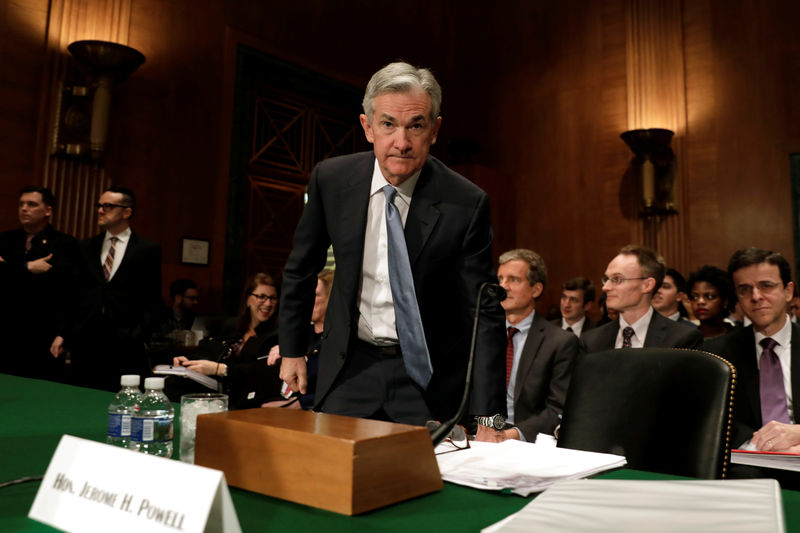
© Reuters. Powell Seeks to Reassure Lawmakers Fed Will Curb Hot Inflation
(Bloomberg) — Federal Reserve Chair Jerome Powell will try to reassure lawmakers this week that the central bank will act to curb the hottest inflation in four decades while remaining flexible in the face of uncertainty posed by Russia’s invasion of Ukraine.
Powell, in semiannual monetary-policy testimony to House and Senate panels starting Wednesday, is likely to signal the U.S. central bank will go ahead with plans for raising interest rates in March, with traders parsing his comments for hints of a potential half percentage-point move.
At the same time, he may acknowledge the risks created by the conflict, which has triggered one of the worst security crises in Europe since World War II and caused oil prices to jump — are complicating the Fed’s job.
Officials have to contend with potentially stagflationary fallout from the invasion. Higher oil prices could dim demand by denting spending power if that leads to higher prices at the gas pump, but will also push headline inflation higher.
Adding to the uncertainty is Powell’s own position: He’s currently serving as chair “pro tempore” while awaiting Senate confirmation to a second term. His and other Fed nominations remain stalled over Republican opposition to President Joe Biden’s pick of Sarah Bloom Raskin for Fed vice chair of supervision.
“Powell will be teeing up liftoff, but also he is going to convey a high sense of uncertainty,” said Ethan Harris, head of global economics research at Bank of America Corp (NYSE:BAC)., who’s predicting a quarter-point move in March. “He needs to give a balanced talk that expresses concern about inflation and recognizes the strength in economic growth but says we don’t need to rush and there are uncertainties out there.”
Fed officials in the wake of the Russian invasion have signaled their readiness to raise interest rates when they meet March 15-16 to confront inflation, while keeping their options open on how far or how fast they move following liftoff.
What Bloomberg Economics Says…
“Bloomberg Economics expects Powell to sound vigilant on inflation, but ultimately favor the gradualist approach to rate hikes due to elevated market uncertainty from the Russia-Ukraine crisis. He will not provide an explicit endorsement of a 50-basis-point hike for the March meeting, in our view. Bloomberg Economics expects the Fed to deliver a 25 basis-point hike in March.”
–Anna Wong, Yelena Shulyatyeva, Andrew Husby and Eliza Winger (Bloomberg economists)
–To read the note, click here
The Ukraine crisis could put Powell in a difficult spot because rising prices of oil and other commodities could push the annual inflation rate higher than the 7.5% reading for January, while trimming U.S. growth as it hurts spending of consumers. Oil prices have surged in the wake of Russia’s attack.
“This is the Fed’s nightmare scenario, as we are pouring fuel onto an already well-kindled fire of inflation,” said Diane Swonk, chief economist for consultancy Grant Thornton. “The situation has eerie similarities to the 1970s, with external oil shock threatening a more entrenched and vicious inflation cycle.”
Traders and economists alike still see the Fed kicking off rate hikes in March and a quarter-point increase is fully priced in. But bets of a bigger half-point move have been scaled back drastically as investors assess the likely impact of the Russian aggression on growth and Fed policy in the months ahead.
Atlanta Fed President Raphael Bostic on Monday said that he is still in favor of raising rates by 25 basis points in March and was open to discussing a 50 basis-point increase if inflation data between now and the meeting comes in too hot.
Officials left rates near zero in January but said they were ready to raise them “soon.” Powell’s post-meeting press conference was viewed as as hawkish at the time, leading some investors to anticipate a half-point move, but he was expected to strike a more careful tone during his testimony.
“He will be more cautious given the financial market nervousness created by the Russian military assault and this will likely cement expectations for a 25 basis point rate increase,” said James Knightley, chief international economist at ING.
Data on Friday showed the Fed’s preferred gauge of price pressures rising 6.1% in the 12 months through January — three times the 2% target and the most since 1982. Another measure, the consumer price index, has shown a larger 7.5% gain, and the February CPI report will be released March 10. Officials get another important piece of evidence Friday with the February employment report.
While inflation will be a focus, lawmakers could also ask Powell about the role of the Fed in implementing sanctions on Russians through the central bank’s payment system, said John Silvia, founder of Dynamic Economic Strategy and former chief economist at the Senate banking panel.
©2022 Bloomberg L.P.
Source: Investing.com


























